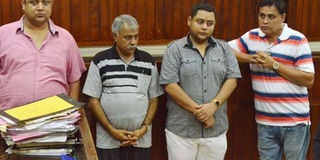Lawyers poke holes into extradition of Akasha brothers

From left: Baktash Akasha Abdalla, Gulam Hussein, Ibrahim Akasha Abdalla and Vijaygiri Anandgiri Goswami in a Mombasa court on June 20, 2016 for the mention of their extradition case. They are facing drug-trafficking charges. PHOTO | FILE | NATION MEDIA GROUP
What you need to know:
- After arresting Baktash and Ibrahim Akasha, the Kenyan government transferred them to the custody of the US Drug Enforcement Agency.
- The brothers are scheduled to go on trial in October on drug-trafficking charges that could result in sentences of life imprisonment.
NEW YORK
A high-ranking Kenyan police official has told a US court that the Kenyan government independently ordered the "expulsion" of the Akasha brothers last year.
The sworn statement by Hamsi Salim Massa, head of the anti-narcotics unit in the Directorate of Criminal Investigations, raises questions as to whether the government has legal authority to force Kenyan citizens to leave the country.
"It seems unlikely that the government can say 'you're a bad person; we're kicking you out of the country,'" Christopher Cassar, defence attorney for Baktash Akasha, said in an interview on Friday.
"Under US law this can't happen," Mr Cassar added. "You have to have due process and you have certain inalienable rights."
Mr Massa declares "under penalty of perjury" that the Kenyan government "ordered the expulsions of the Akashas on its own volition".
DRUG-TRAFFICKING CHARGES
No US government officials played a part in the Kenyan government's "internal deliberations" and "independent decisions" to decree the removal from the country of the two brothers, Mr Massa says.
After arresting Baktash and Ibrahim Akasha, the Kenyan government transferred them to the custody of the US Drug Enforcement Agency (DEA), Mr Massa relates.
The DEA personnel then flew the Akashas to New York where they had previously been indicted on charges of conspiring to smuggle narcotics into the United States.
The brothers, detained in New York for the past 19 months, are scheduled to go on trial in October on drug-trafficking charges that could result in sentences of life imprisonment.
Mr Massa's statement is included in a court document filed last week by US government prosecutors in response to a move by defence attorneys to have the case terminated.
That petition is based in part on the Akasha lawyers' contention that the brothers, both of whom are Kenyan nationals, were "forcibly kidnapped" in violation of a US-Kenya extradition treaty.
Presiding Judge Victor Marrero is likely to reject the defence team's argument.
EXTRADITION TREATY
He had ruled in July in response to an earlier filing by the Akashas' representatives that the brothers' removal from Kenya before they were formally extradited does "not run afoul of any provisions of the [Extradition] Treaty," Judge Marrero wrote.
The treaty does not stipulate that extradition is the only means by which a Kenyan national may be transferred to the US for criminal prosecution, the judge noted.
Extradition proceedings were underway in a court in Mombasa at the time the Akashas were expelled from Kenya.
Police had arrested the brothers on drug charges in Kenya in 2014, but they had not been convicted of those alleged crimes.
In their filing last week with the US court in New York, prosecutors describe the Akasha brothers as "well-know, notorious gangsters in Kenya".
HEROIN
The filing recounts the background of the US narcotics-smuggling charges brought against the Akashas.
"Beginning in approximately March 2014, Baktash and Ibrahim began to work with others, including one or more confidential sources acting at the direction of the DEA and purporting to be Colombian drug traffickers (the 'Sources') to obtain large quantities of heroin from the Afghanistan-Pakistan region and send those narcotics to the United States," the prosecution's court document states.
"During March 2014 recorded meetings with the Sources in Mombasa, Kenya, Baktash declared, in substance, that he could provide 'one hundred percent' pure 'white crystal' heroin at a price of between $9,000 (Sh906,000) and $12,000 per kilogramme," the filing continues.
A few months later, the Akasha brothers started negotiations with the undercover DEA agents regarding shipment of a large quantity of methamphetamines to the US, the prosecution recounts.
In November 2014, Ibrahim Akasha "and others" delivered about 98 kilogrammes of heroin to "the Sources in Nairobi, and Ibrahim received about $70,000 from one of the sources", the filing states.
NOT GUILTY PLEA
The brothers have also been accused by US prosecutors of bribing unnamed Kenyan officials and "brandishing" firearms while carrying out their alleged crimes.
Two other men -- Pakistani national Gulam Hussein and India citizen Vijaygiri Goswami -- have also been charged in the US as part of the smuggling conspiracy.
Mr Hussein and Mr Goswami were taken to New York by DEA agents at the same time as were the Akasha brothers.
The Akashas and Mr Hussein have pleaded not guilt to all charges brought by US prosecutors.
Mr Goswami has not appeared along with the other three defendants at recent court sessions in New York and is believed to have agreed to cooperate with the prosecution.





